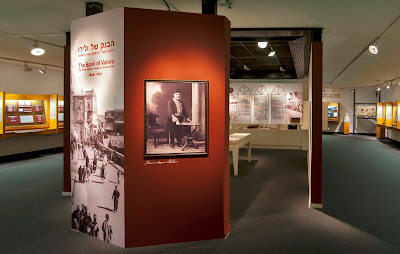The Eretz Israel Museum, located near Tel Aviv, focuses on the history and culture of Israel. Artifacts, from the 4th millennium BCE to the present, are showcased in several thematic pavilions. One of these, the Kadman Numismatic Pavilion, features coins, bank notes, etcetera. The Alexander Pavilion of Postal History and Philately tells us the postal history of Israel from the mid-19th century until the founding of the state in 1948 by showing us envelopes, letters, rare stamps and much more. The museum also includes a planetarium.
 |
| The Valero Bank exhibition Curator: Cecilia Meir image source: Eretz Israel Museum photographer: Leonid Padrul-Kwitkowski double-click image to enlarge |
The museum has prolonged its temporary exhibition The Valero Bank until December 31, 2014. The exhibition deals with the activities from the bank that took place in Jerusalem in the 19th and early 20th century. In this period Palestine was under Ottoman rule, a situation that lasted until World War I.
Ya'akov (Jakob) Valero (1813–1874) opened his bank, Jacob Valero & Company, in 1848. Under the direction of his son Haim Aharon Valero (1845–1923) the Valero Bank acted as catalyst in the early development of the Eretz Israel/Palestine region and supported its Jewish community towards the modernization of the 20th century. The bank’s capital and services were employed in the acquisition of land and building. At a certain point in time, when money for trade was scarce, the bank issued also its own currency : notes that came in one and five piastre denominations.
Ya'akov (Jakob) Valero (1813–1874) opened his bank, Jacob Valero & Company, in 1848. Under the direction of his son Haim Aharon Valero (1845–1923) the Valero Bank acted as catalyst in the early development of the Eretz Israel/Palestine region and supported its Jewish community towards the modernization of the 20th century. The bank’s capital and services were employed in the acquisition of land and building. At a certain point in time, when money for trade was scarce, the bank issued also its own currency : notes that came in one and five piastre denominations.
The Valero bank provided services for the Ottoman government and was often asked to support the government by providing loans or by purchasing government bond issues. The bank carried out financial transactions with numerous banks in Palestine and throughout the world, among them banks that belonged to the Rothschild family, but also with other governments such as the Russian Empire and the Austro-Hungarian Empire.
 |
| Valero Bank check for 227.81 Austro-Hungarian crowns made out by S.M. Rothschild to Assad C. Kayat signed by Aharon Valero and issued February 12 1903, Jerusalem image source: Eretz Israel Museum double-click image to enlarge |
Jewish pre-WWI banking history is an unusual subject in scripophily. Even with only a very few certificates on display, the engaging story of the Valero Bank makes the exhibition worthy of a visit.
Practical info
- Locaton : Eretz Israel Museum, Ramat Aviv,Tel Aviv
- Duration : until December 31 2014
- Opening hours : Sunday-Thursday 10:00-16:00, Friday-Saturday 10:00 - 14:00
- Entrance fee : children under 18 free, adults 48 NIS (about 10 EUR/14USD)
- More info, see here
Related links
Further reference
- The Valero Family - Sephardi-Arab Relations in Ottoman and Mandatory Jerusalem, a paper by R. Kark & J.B. Glass
- Sephardi Entrepreneurs in Jerusalem: The Valero Family 1800-1948, by Joseph B. Glass and Ruth Kark, ISBN: 978-965-229-396-1, Gefen Publishing House Ltd., book partly online see here
- www.valero-family.org
F.L.
No comments:
Post a Comment